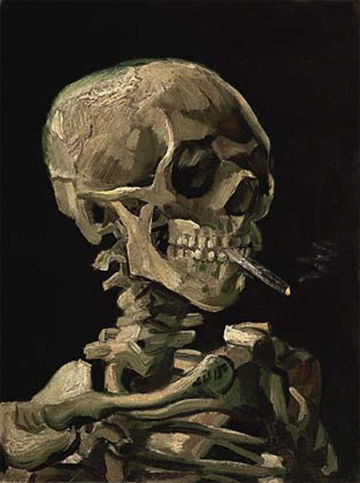Ingmar Bergman (1918-2007)
 Ήταν Τεράστιος. Το έργο του του έχει χαρίσει την αθανασία στις καρδιές των κινηματογραφόφιλων. Άνθρωπος εσωτερικά ταλανισμένος, με ανήσυχο και ασυμβίβαστο πνεύμα, έζησε το μεγαλύτερο μέρος της ζωής του κατ' αντιστοχία με αρκετούς από τους ήρωες των ανεπανάληπτων ταινιών του. Υπήρξε απόλυτα συνεπής στις αξίες που πρέσβευε και υπηρετούσε διά της Τέχνης του. Η αδυσώπητη ειλικρίνεια που τον χαρακτήριζε ως άνθρωπο και ως δημιουργό σπανίζει στις μέρες μας. Είναι αναντικατάστατος.
Ήταν Τεράστιος. Το έργο του του έχει χαρίσει την αθανασία στις καρδιές των κινηματογραφόφιλων. Άνθρωπος εσωτερικά ταλανισμένος, με ανήσυχο και ασυμβίβαστο πνεύμα, έζησε το μεγαλύτερο μέρος της ζωής του κατ' αντιστοχία με αρκετούς από τους ήρωες των ανεπανάληπτων ταινιών του. Υπήρξε απόλυτα συνεπής στις αξίες που πρέσβευε και υπηρετούσε διά της Τέχνης του. Η αδυσώπητη ειλικρίνεια που τον χαρακτήριζε ως άνθρωπο και ως δημιουργό σπανίζει στις μέρες μας. Είναι αναντικατάστατος.
Update 31/07/2007
Από τις νεκρολογίες που δικαιολογημένα κατέκλυσαν τον τύπο, ξεχώρισα την παρακάτω.Through a glass clearly
Οι τρεις τελευταίες παράγραφοι συνοψίζουν, πιστεύω, με τον γλαφυρότερο τρόπο την ουσία και την κεφαλαιώδη σημασία του έργου του.
Leader
Tuesday July 31, 2007
The Guardian
Ingmar Bergman's work always had, and always will have, its critics. It was too gloomy for many, too unpolitical for some, and too artful for others. Yet with Bergman's death at the age of 89, after a career in the cinema of some 60 years, there can be no real argument either about the sustained moral achievement of his work or about his importance in the history of cinema in general, of European cinema in particular and of Swedish cinema specifically.
Bergman's 54 films of various kinds range from the austerity of The Seventh Seal to the intimacy of Smiles of a Summer Night, and from the ruthlessness of Persona to the tenderness of Fanny and Alexander. He made films about childhood, love, pain, art, hardship, death and God. The phrase "lifetime achievement" is one of the most abused in the cinema industry, lavished all too indiscriminately on minor artists of limited range and intermittent inspiration. Yet if any film-maker had a right to such an award, that film-maker was Bergman.
Bergman belonged to an era which took the cinema seriously as an art form, and which thought it was the obligation of the cinema to tell difficult stories and to address troubling issues. His films put actors, their faces and voices at the centre of the screen, because Bergman was from the start a man of the theatre; he nurtured a remarkable succession of great screen actors. He also understood that camera work was an art form in itself, and for much of his career he worked with one of the greatest of all cinematographers, the late Sven Nykvist.
Bergman's passing is a reminder that serious cinema will only have a place in the artistic world as long as film-makers lay claim to one. When Bergman's career was at its height, between 1955 and 1980, European art cinema was beyond doubt a central part of the global movie industry. Today that is a questionable claim. Throughout his lifetime Bergman built on the work of earlier Scandinavian film-makers to make Swedish cinema into an independent artistic force of global importance. Yet today few would count Sweden among the great movie-making nations any longer.
Bergman's career is a reminder that artists are not judged solely by their technique or their ability to shock but by their inner moral honesty and by their inspiration. Bergman understood that the deepest questions about life and death, youth and age, selfishness and kindness, can be answered as well in a single room or on a windswept island as they can in the hubbub of a city. Like Mozart, whom he revered, he knew how to say profound things with great simplicity. Bergman was pessimistic in many ways, but his films have an inner light of humanity that stands as a reprimand to too many of his successors.


4 σχόλια:
Είναι Γιώργο μου, ήταν...
50 χρόνια μετά την 7η σφραγίδα, δεν πρέπει να αμφιβάλλουμε. Ο Χάρος έχει χάσει από τον μεγάλο Σουηδό. Η αθανασία είναι γεγονός. Και του ανήκει.
Ο Zubi το είπε σε μισή φράση.
Όλη η αντίφαση.
Σ'ευχαριστώ για τις γραμμές που του αφιέρωσες.
Το μόνο που μας μένει πλέον φίλτατοι συλλυπούντες είναι το έργο του. Για τεχνικούς λόγους δεν είμαι σε θέση δυστυχώς να τιμήσω την μνήμη του βλέποντας απόψε μια ταινία του ώστε να ξανανιώσω τη μεγαλοφυΐα του. Άτιμη μοίρα.
Δημοσίευση σχολίου